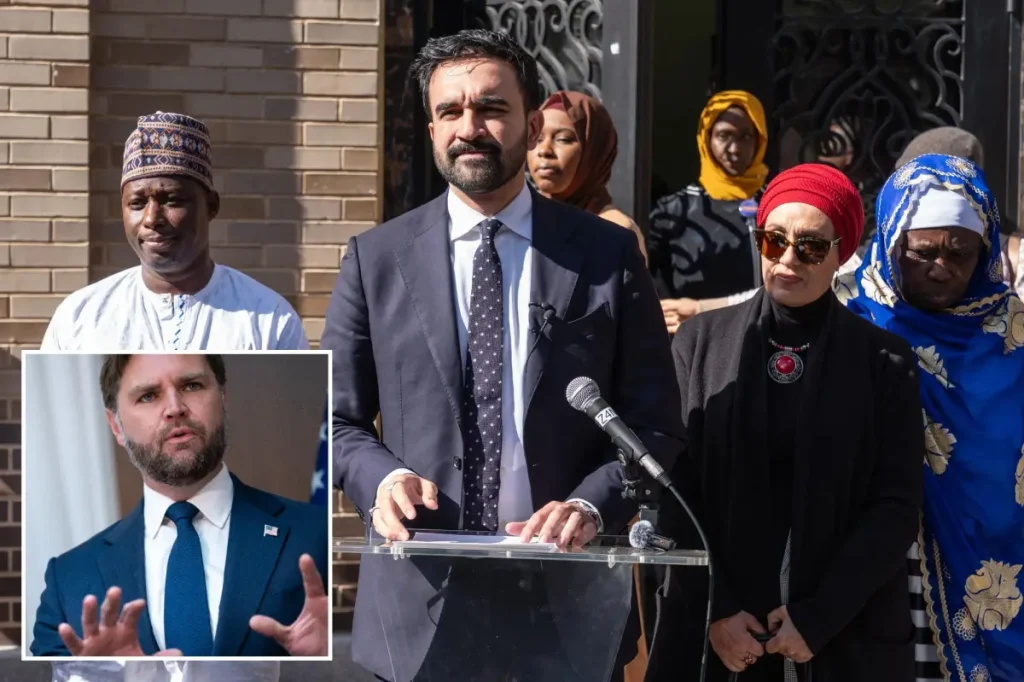Navigating Identity and Politics: Vance, Mamdani, and the Echoes of 9/11
In a heated exchange that reflects America’s ongoing struggle with identity politics and the long shadow of 9/11, Vice President JD Vance recently criticized New York City mayoral candidate Zohran Mamdani over comments about his aunt’s post-9/11 experiences. As early voting commenced in New York City, Vance took to social media platform X to challenge Mamdani’s recounting of how his hijab-wearing aunt “stopped taking the subway after September 11th because she did not feel safe.” Vance’s dismissive characterization—claiming Mamdani portrayed his aunt as “the real victim of 9/11” who merely “got some (allegedly) bad looks”—highlights the profound disconnect in how different Americans interpret the aftermath of that tragic day. Mamdani, currently the frontrunner in the mayoral race against former Governor Andrew Cuomo and Curtis Sliwa, speaks from the perspective of Muslim Americans who faced heightened scrutiny and discrimination following the attacks, while Vance’s response reflects a view that such experiences pale in comparison to the direct victims of the terrorist attack itself.
The controversy extends beyond a simple political disagreement, touching on the lived experiences of Muslim Americans in post-9/11 America. Mamdani’s campaign remarks painted a broader picture of alienation felt by many Muslim New Yorkers: “I want to speak to every child who grows up here marked as the other, who is randomly selected in a way that never quite feels random, who feels that they carry a stain that can never be cleaned. Growing up in the shadow of 9/11, I have known what it means to live with an undercurrent of suspicion in this city.” His comments resonate with many who experienced the shift in public sentiment after the attacks—Muslim Americans who continued serving their communities as teachers, police officers, and public servants “only to see their leaders spit in their face,” as Mamdani described it. This perspective represents an often understated aspect of American history: how the tragedy of 9/11 created secondary victims through suspicion, discrimination, and the erosion of civil liberties for those who shared nothing with the perpetrators except perceived religious or ethnic similarities.
The tension escalated further when former Governor Andrew Cuomo appeared on a radio show where the host speculated that Mamdani would be “cheering” if New York faced another 9/11-style attack. During the WABC “Sid & Friends in the Morning” broadcast, Cuomo questioned Mamdani’s leadership capabilities in a crisis, asking, “God forbid, there’s another 9/11. Can you imagine Mamdani in the seat?” When host Sid Rosenberg responded with “He’d be cheering,” Cuomo replied, “That’s another problem,” before returning to his hypothetical scenario. Such inflammatory rhetoric exemplifies how Muslim identity continues to be weaponized in American politics more than two decades after the attacks. When confronted about these comments later, Mamdani directly characterized them as Islamophobic, adding that they were “not only racist, it’s also disgusting,” especially coming from “a former governor who, in his final moments in public life, is engaging in rhetoric” of this nature.
The exchange highlights the complex intersection of personal identity, collective trauma, and political ambition in America’s largest city. New York City, which bore the brunt of the 9/11 attacks, continues to wrestle with their memory and meaning. For many New Yorkers, including Muslim Americans, the attacks represent a dual trauma—both the horror of the event itself and the subsequent suspicion cast upon entire communities. Mamdani’s candidacy brings this tension to the forefront, challenging voters to confront difficult questions about representation, fear, and belonging in a diverse metropolis. His campaign represents both the progress made since 2001—that a Muslim American could lead as mayor of New York would have seemed unimaginable in the immediate aftermath—and the persistent barriers of suspicion and othering that remain embedded in American political discourse.
The controversy also reveals how 9/11 remains a potent political touchstone that can be weaponized in contemporary debates. While over two decades have passed since that September morning, politicians continue to invoke the attacks to question opponents’ patriotism, values, or fitness for office. The suggestion that a Muslim American candidate might “cheer” another attack represents an extreme manifestation of this rhetoric, but more subtle forms persist throughout American politics. This tendency to conflate religious identity with potential disloyalty has historical parallels—from suspicion of Catholic politicians to antisemitic conspiracies about Jewish Americans—yet the post-9/11 scrutiny of Muslim Americans has proven particularly enduring and damaging. Mamdani’s campaign confronts this legacy directly, challenging voters to examine their assumptions about who can legitimately represent and lead a diverse American city.
As New York City voters head to the polls, they face a choice that extends beyond typical policy differences between candidates. The mayoral race has become a referendum on inclusion, representation, and the city’s vision of itself more than twenty years after its darkest day. Mamdani’s candidacy asks New Yorkers to consider whether they can embrace leadership that explicitly acknowledges the complex aftermath of 9/11 for all communities, including those who faced discrimination. Meanwhile, the reactions from figures like Vance and Cuomo demonstrate how entrenched certain narratives about Muslim Americans remain in political discourse. The outcome of this election will signal not just New York’s political direction but also its willingness to confront the full legacy of 9/11—both the unity that emerged in its immediate aftermath and the divisions that have persisted in its shadow. As the city and nation continue to grapple with questions of identity and belonging, this mayoral race serves as a mirror reflecting America’s ongoing struggle to live up to its pluralistic ideals.


